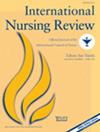Relationship of high‐fidelity simulation experience, clinical reasoning, and clinical competence of new nurses: A cross‐sectional study
IF 3.8
3区 医学
Q1 NURSING
引用次数: 0
Abstract
AimThis study aimed to determine which high‐fidelity simulation (HFS) experiences were associated with clinical reasoning and clinical competence among new nurses.BackgroundHFS has been actively used in nursing education. It is necessary to verify the effects of HFS transfer to the clinical environment.DesignA cross‐sectional study reported following STROBE criteria.MethodsData were collected on new nurses (高仿真模拟经验、临床推理和新护士临床能力之间的关系:横断面研究
背景高仿真模拟(HFS)已被广泛应用于护理教育中。方法 收集在本科四年级课程中体验过 HFS 的新护士(n = 224)的数据。对 HFS 的数量、模拟元素的包含情况、模拟元素对学习、临床推理和临床能力的重要性进行了测量。分层回归模型考察了与临床推理和临床能力相关的因素。结果反馈是HFS学习中最充分的元素,参与者认为它是最重要的。与临床能力相关的一个重要因素是临床推理,HFS设计通过临床推理间接影响了临床能力。提高学生的临床推理能力应该是本科课程中 HFS 学习的一个重要目标,以培养学生成为有临床能力的护士。对护理政策的启示护士教育者和领导者可以通过在护理教育政策中强调培养护士临床推理能力的教育来提高护士的临床能力。
本文章由计算机程序翻译,如有差异,请以英文原文为准。
求助全文
约1分钟内获得全文
求助全文
来源期刊
CiteScore
7.90
自引率
7.30%
发文量
72
审稿时长
6-12 weeks
期刊介绍:
International Nursing Review is a key resource for nurses world-wide. Articles are encouraged that reflect the ICN"s five key values: flexibility, inclusiveness, partnership, achievement and visionary leadership. Authors are encouraged to identify the relevance of local issues for the global community and to describe their work and to document their experience.

 求助内容:
求助内容: 应助结果提醒方式:
应助结果提醒方式:


